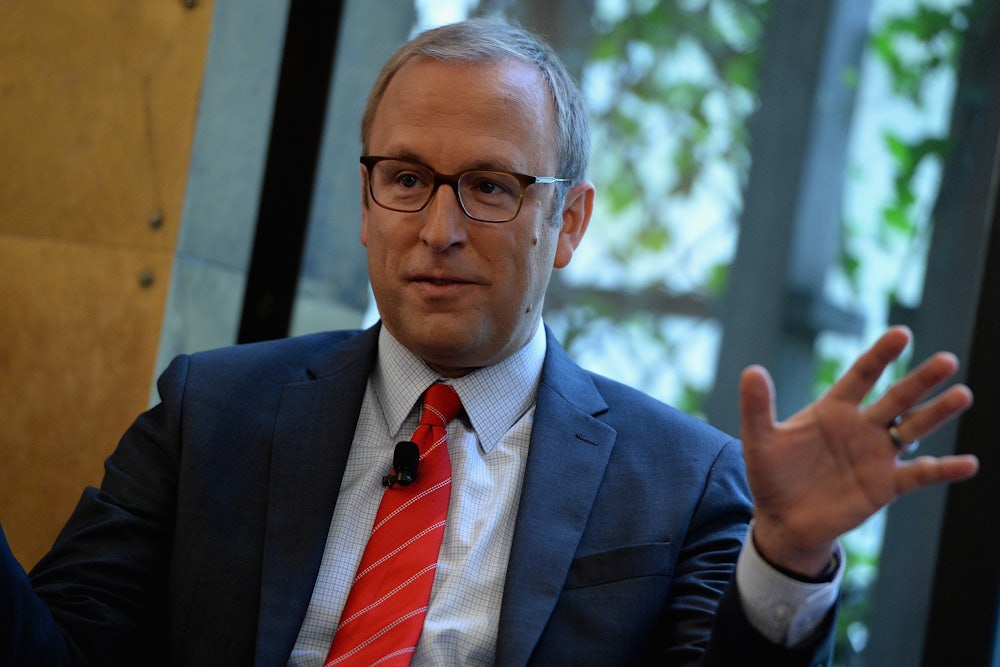Jonathan Karl, the guest host of ABC’s This Week, knew exactly what he was doing on Sunday when he asked Republican Representative Steve Scalise if the 2020 election was stolen. This was, on its face, a simple and straightforward question. No evidence of voter fraud has emerged over the past four months, and Joe Biden has been president since January 20. Karl may as well have asked if the sky was blue.
That was precisely the point. For the next 70 seconds, Scalise hemmed and hawed. He gestured at sinister, conspiratorial acts, and alluded to “states that did not follow their state laws” and “the problems that happened with the election” that “millions of people are still concerned about.” Moments earlier, when asked if Donald Trump was to blame for the riots at the Capitol on January 6, Scalise gave a similar answer: “Surely, there’s a lot of blame to go around.”
Rep. Steve Scalise evades questions on Pres. Trump's responsibility in inciting the Jan. 6 siege on the Capitol: "Certainly there's a lot of blame to go around."@jonkarl: "I'm asking about Donald Trump's role in this."
— ABC News Politics (@ABCPolitics) February 21, 2021
Scalise: "President Trump has denounced what happened." pic.twitter.com/lpnUIGwYhC
Karl asked these questions because he knew that Scalise couldn’t answer them truthfully or in a straightforward manner. In journalism there is no simpler trick than this: Ask an easy question that you know will trip up your subject.
But having set this trap for Scalise, Karl then did next to nothing. He interjected once at the beginning to underscore the ridiculousness of Scalise’s nonanswers, but then simply sat back and let him say them. There was no pushback, no effort to highlight Scalise’s absurdity. When he was finished, Karl thanked him and moved on with his show. The House GOP whip will undoubtedly be back on This Week.
The episode raises the question: What is the point, anymore, of the Sunday shows?
The Sunday shows are not designed to inform or educate. They are barometers of what representatives from the two parties think is important. The goal is not to understand an issue, let alone divine the truth, but to broadcast what Democrats and Republicans care about at that moment. They are vehicles for talking points rather than works of journalism.
The hosts of these shows naturally disagree. Writing in Politico last month, Chuck Todd of Meet the Press implored anti-Trump Republicans to stand up and be counted by appearing on his show. “If you are a Republican and think your side isn’t being represented or that there’s too much focus on the Trump wing, show up and say something,” he wrote. These shows, Todd’s argument continued, were the best place for rational discourse in a landscape otherwise dominated by cable news and social media. “The mainstream Sunday shows are still the best place for sober debate, if the sober-minded elected officials will participate and show their constituents of all political stripes they aren’t afraid of tough but fair questions about any issue, whether politically problematic for their side or not.”
As Todd proves, a decades-long effort by the right to delegitimize mainstream news organizations has made them hypersensitive to criticism of supposed liberal bias. Meet the Press trips over itself to fill its panels with conservatives like Hugh Hewitt and Rich Lowry, while figures from the left are far less common. These right-wing efforts to work the refs have largely been successful, creating an environment in which any objection Republicans receive from mainstream journalists is then transformed into proof of anti-conservative bias.
One could see all of these pressures at work in Karl’s interview with Scalise. It’s clear that the ABC host thought his job began and ended with asking the question. He succeeded in revealing that Scalise did not think that Joe Biden was the legitimate president and that Scalise, like other House Republicans, ostensibly believes in a lie. He failed in every other way.
The easiest way for shows like Face the Nation and Meet the Press to address politicians like Scalise is simply not to have them on if they continue to deny basic facts—otherwise these shows become vehicles for propaganda. But that would, as Jason Zengerle wrote in The New York Times earlier this month, be a direct attack on the “self-conception” of the Sunday shows themselves. “If This Week and Meet the Press were to deplatform Republicans who won’t acknowledge, without caveats, that Biden won, then their guests would consist almost entirely of Democrats—and the Sunday shows would resemble prime-time programs on MSNBC and CNN. No self-respecting Sunday show wants that.”
If Republicans are still going to be invited, however, more is needed—and the Sunday shows themselves may want to look to cable news for answers. The more pugilistic style of Jake Tapper, who hosts CNN’s State of the Union, works better than the more credulous approach you find on the networks.
But overall, the format itself feels exhausted, a relic from an earlier, more consensus-driven era. These were shows designed to highlight respectful political difference and to provide a place where both sides could come together and spin the public. These were not shows designed for a political system where one party wrongly believes that an election has been stolen, or that lives in fear of the whims of one man. The Sunday shows remain influential, but they haven’t been relevant in a long time.








